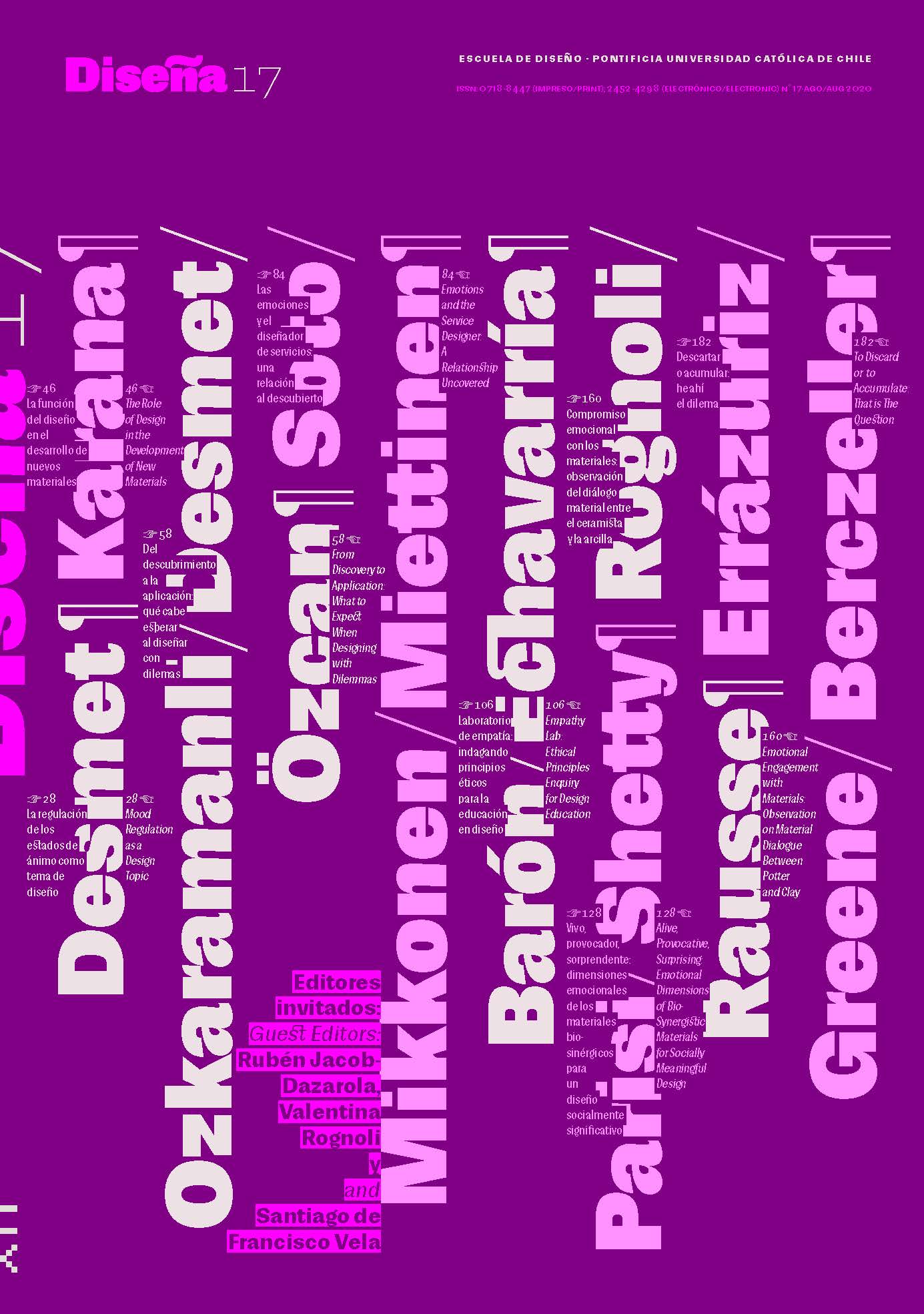To Discard or to Accumulate: That is The Question
Main Article Content
Abstract
In recent years, minimalist home maintenance trends have gained strength with the well-renown Japanese organizing consultant Marie Kondo standing out among its ambassadors. Kondo promotes the construction of ideal homes through the evaluation of each domestic object, keeping those that would ‘spark joy’ while discarding the rest. Based on research carried out in Santiago, this article reflects on the various ways in which objects are kept, valued and arranged in Chilean homes. The relevance and pertinence of these new minimalist trends are discussed, since the results suggest that households are more frequently guided by an ethic of care and conservation, valuing the temporal and dynamic condition of their objects, as well as their participation in an ‘ecology of things’.
Downloads
Article Details

This work is licensed under a Creative Commons Attribution-ShareAlike 4.0 International license.
COPYRIGHT NOTICE
All contents of this electronic edition are distributed under the Creative Commons license of "Attribution-ShareAlike 4.0 Internacional" (CC-BY-SA). Any total or partial reproduction of the material must mention its origin.
The rights of the published images belong to their authors, who grant to Diseña the license for its use. The management of the permits and the authorization of the publication of the images (or of any material) that contains copyright and its consequent rights of reproduction in this publication is the sole responsibility of the authors of the articles.
References
ARIZTÍA, T., AGLONI, N., & PELLANDINI‐SIMÁNYI, L. (2018). Ethical Living: Relinking Ethics and Consumption through Care in Chile and Brazil. The British Journal of Sociology, 69(2), 391-411. https://doi.org/10.1111/1468-4446.12265
BECKER, J. (2018). The Minimalist Home: A Room-by-Room Guide to a Decluttered, Refocused Life. WaterBrook.
CARDELL, K. (2017). Modern Memory-Making: Marie Kondo, Online Journaling, and the Excavation, Curation, and Control of Personal Digital Data. a/b: Auto/Biography Studies, 32(3), 499-517. https://doi.org/10.1080/08989575.2017.1337993
CASSINGER, C. (2010). Retailing Retold: Unfolding the Process of Image Construction in Everyday Practice. Lund Studies in Economics and Management.
CWERNER, S. B., & METCALFE, A. (2003). Storage and Clutter: Discourses and Practices of Order in the Domestic World. Journal of Design History, 16(3), 229-239. https://doi.org/10.1093/jdh/16.3.229
DION, D., SABRI, O., & GUILLARD, V. (2014). Home Sweet Messy Home: Managing Symbolic Pollution. Journal of Consumer Research, 41(3), 565-589. https://doi.org/10.1086/676922
DOMÍNGUEZ RUBIO, F. (2016). On the Discrepancy between Objects and Things: An Ecological Approach: Journal of Material Culture, 21(1), 59–86. https://doi.org/10.1177/1359183515624128
DOUGLAS, M. (1973). Pureza y peligro. Un análisis de los conceptos de contaminación y tabú. Siglo XXI.
EDENSOR, T. (2005). Waste Matter—The Debris of Industrial Ruins and the Disordering of the Material World: Journal of Material Culture, 10(3), 311-332. https://doi.org/10.1177/1359183505057346
ERRÁZURIZ, T. (2018). Estación Terminal. La vida de las cosas en la vivienda rural. In F. Alarcón (Ed.), Vivienda Rural en el Valle Central (pp. 106-113). ARQ.
ERRÁZURIZ, T. (2019). “Till Death Do Us Part”: The Making of Home Through Holding onto Objects. In F. Martínez & P. Laviolette (Eds.), Repair, Brokenness, Breakthrough: Ethnographic Responses (pp. 45-66). Berghahn.
GFK CHILE. (2019). Estilos de vida de los grupos socioeconómicos en Chile. https://www.anda.cl/wp-content/uploads/2019/05/GfK_GSE_190502_FINAL.pdf
GREENE, R. (2020). A Line in the Sand. Racism, Elite and Comfort in Argentine Gated Communities [Unpublished doctoral dissertation. University of London].
GREGSON, N., METCALFE, A., & CREWE, L. (2009). Practices of Object Maintenance and Repair: How Consumers Attend to Consumer Objects within the Home. Journal of Consumer Culture, 9(2), 248–272. https://doi.org/10.1177/1469540509104376
HARRIS, E., & NOWICKI, M. (2020). “GET SMALLER”? Emerging Geographies of Micro-living. Area, 00(1), 1-9. https://doi.org/10.1111/area.12625
KILROY-MARAC, K. (2016). A Magical Reorientation of the Modern: Professional Organizers and Thingly Care in Contemporary North America. Cultural Anthropology, 31(3), 438-457. https://doi.org/10.14506/ca31.3.09
KONDO, M. (2014). The Life-changing Magic of Tidying Up: The Japanese Art of Decluttering and Organizing. Random House.
KONDO, M. (2016). Spark Joy: An Illustrated Master Class on the Art of Organizing and Tidying Up. Ten Speed Press.
KONDO, M. (2020). KonMari Is Not Minimalism. KonMari | The Official Website of Marie Kondo. https://konmari.com/konmari-is-not-minimalism/
LESLIE, D., & REIMER, S. (2003). Gender, Modern Design, and Home Consumption: Environment and Planning D: Society and Space, 21(3), 293–316. https://doi.org/10.1068/d337
LEWIS, T., & POTTER, E. (2011). Ethical Consumption: A Critical Introduction. Routledge.
LÖFGREN, O. (2017). Mess: On Domestic Overflows. Consumption Markets & Culture, 20(1), 1-6. https://doi.org/10.1080/10253866.2016.1158767
LOREAU, D. (2016). L’art de la Simplicité: How to Live More with Less. St. Martin’s Griffin.
LURY, C. (2011). Consumer Culture. Polity.
MAYCROFT, N. (2009). Not Moving Things Along: Hoarding, Clutter and other Ambiguous Matter. Journal of Consumer Behaviour, 8(6), 354-364. https://doi.org/10.1002/cb.298
MILLBURN, J. F., & NICODEMUS, R. (2011). Minimalism: Live a Meaningful Life. Asymmetrical Press.
MURPHY, E. (2018). Less is More Work: A Governmentality Analysis of Authenticity Within Minimalism Discourse [Doctoral Dissertation, Carleton University]. https://doi.org/10.22215/etd/2018-13211
OUELLETTE, L. (2019). Spark Joy? Compulsory Happiness and the Feminist Politics of Decluttering. Culture Unbound: Journal of Current Cultural Research, 11(3-4), 534-550. https://doi.org/10.3384/cu.2000.1525.191108
PENN, B. (2017). The Little Book of Tidying: Declutter your Home and your Life. Gaia.
RUBIN, G. (2019). Outer Order, Inner Calm: Declutter and Organize to Make More Room for Happiness. Harmony.
SOUKUP, R. (2016). Unstuffed: Decluttering Your Home, Mind and Soul. Zondervan.
STRASSER, S. (1999). Waste and Want: A Social History of Trash. Metropolitan.
WEINSWIG, D. (2017). Is Minimalism the New Normal? Marie Kondo Is Expanding KonMari To Organize the World. Forbes. https://www.forbes.com/sites/deborahweinswig/2017/08/09/is-minimalism-the-new-normal-marie-kondo-is-expanding-konmari-to-organize-the-world/
ZALEWSKA, J., & COBEL-TOKARSKA, M. (2016). Rationalization of Pleasure and Emotions: The Analysis of the Blogs of Polish Minimalists. Polish Sociological Review, 196(4), 495-412.

